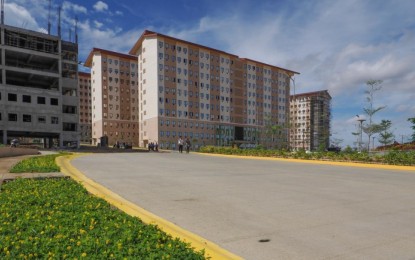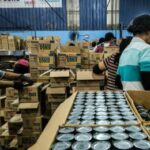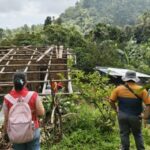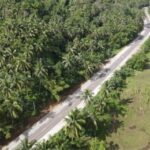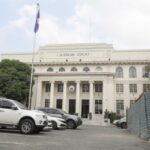MANILA – The Social Housing Finance Corporation (SHFC) is relaunching its Community Mortgage Program (CMP) with significant enhancements to better serve low-income families and informal settler communities.
In an interview on Monday, SHFC President and Chief Executive Officer Federico Laxa said the enhanced CMP will not only finance land acquisition for organized communities but will now also provide additional loans for community development and site upgrading.
“This time, we are making the program transformative; we’re going beyond just acquisition of land, we can provide additional loans to our fellowmen to develop their land and improve their community,” he said.
CMP is a key component of the expanded National Housing Program for Filipinos (4PH).
It is designed to assist organized homeowners’ associations or cooperatives whose members live on land they do not own.
Through SHFC financing, these communities can purchase the land and gradually pay affordable amortizations of just PHP500 to PHP600 monthly —amounts considered accessible even to families earning as little as PHP3,000 per month.
“This makes housing truly affordable for our poorest families,” Laxa said.
He also clarified that CMP is not for individuals but for communities that organized themselves into homeowners’ associations, as the program offers loans to the community.
These groups must register with the appropriate agency, like the Department of Human Settlements and Urban Development (DHSUD) or the Cooperative Development Authority if they are a cooperative.
To date, the DHSUD has approved 34 onsite CMP projects, which are expected to benefit more than 5,000 families. SHFC targets to start awarding these projects by October 2025.
In addition to CMP, SHFC is also implementing vertical housing developments in various areas, including San Fernando, Tagoloan in Misamis Oriental, Davao City, and Palawan. Some beneficiaries have already occupied their units, while others are awaiting formal awarding.
Laxa also underscored SHFC’s involvement in resettlement projects in partnership with the Department of Transportation, specifically for families displaced by the South Railway Project.
According to SHFC, more than 10,000 families have already been housed under their programs, and the number is expected to increase rapidly with the rollout of the enhanced CMP and expanded 4PH initiatives.
Palayan City Township Housing Project
The Palayan City Township Housing Project is a government-initiated urban development in Palayan City, Nueva Ecija, Philippines, established in the 1960s under President Diosdado Macapagal. Designed as a planned community, it aimed to decentralize government functions and provide housing for employees relocating from Manila. Today, it remains a symbol of mid-20th-century Philippine urban planning and socio-economic development efforts.
Social Housing Finance Corporation
The **Social Housing Finance Corporation (SHFC)** is a government agency in the Philippines established to provide affordable housing solutions for low-income families. It was created under the **Urban Development and Housing Act of 1992** and operates programs like the **Community Mortgage Program (CMP)** to help informal settlers secure land tenure and housing financing. The SHFC plays a key role in promoting inclusive urban development and poverty alleviation through accessible housing initiatives.
Community Mortgage Program
The **Community Mortgage Program (CMP)** is a housing initiative in the Philippines, launched in 1988, designed to assist low-income families in securing affordable land tenure and housing. It enables communities to collectively purchase land through government-supported loans, often involving organized groups or cooperatives. The program aims to reduce urban poverty and improve living conditions by providing legal land ownership and access to basic services for informal settlers.
National Housing Program for Filipinos
The **National Housing Program for Filipinos** is a government-led initiative in the Philippines aimed at addressing housing shortages and providing affordable homes for low-income families. Established under various agencies like the **National Housing Authority (NHA)** and the **Social Housing Finance Corporation (SHFC)**, it includes projects such as community resettlement, subsidized housing, and financing schemes. The program reflects ongoing efforts to improve living conditions and reduce urban informal settlements in the country.
Department of Human Settlements and Urban Development
The **Department of Human Settlements and Urban Development (DHSUD)** is a Philippine government agency responsible for ensuring access to affordable, sustainable, and resilient housing and urban development. Established in 2019 under Republic Act No. 11201, it replaced the Housing and Urban Development Coordinating Council (HUDCC) to streamline policies and programs for informal settlers, low-income families, and urban planning. The department plays a key role in addressing housing backlogs and promoting inclusive, well-planned communities across the Philippines.
Cooperative Development Authority
The **Cooperative Development Authority (CDA)** is a Philippine government agency established in 1990 to promote and regulate cooperatives as instruments of economic growth and social equity. It oversees the registration, policy implementation, and development support for cooperatives nationwide, fostering self-reliance and community empowerment. The CDA operates under Republic Act No. 6939, ensuring cooperatives adhere to democratic principles and contribute to sustainable development.
South Railway Project
The **South Railway Project** refers to a modern infrastructure initiative aimed at expanding and improving rail networks in the southern regions of a country (specific location may vary). Often designed to enhance connectivity, boost economic growth, and reduce travel times, such projects may involve new high-speed rail lines or upgrades to existing tracks. Historical context depends on the region, but similar projects globally have transformed transportation, such as Japan’s Shinkansen or Europe’s high-speed rail expansions.
*(If you meant a specific project, like Saudi Arabia’s **Southern Railway** or another, please clarify for a more detailed summary!)*
San Fernando
San Fernando is a historic city in the Philippines, located in the province of Pampanga. Founded in 1754, it served as a vital Spanish colonial hub and later became the capital of Pampanga. Today, it is known for its rich cultural heritage, including the vibrant Giant Lantern Festival (Ligligan Parul), a celebrated annual event showcasing elaborate, illuminated lanterns.

